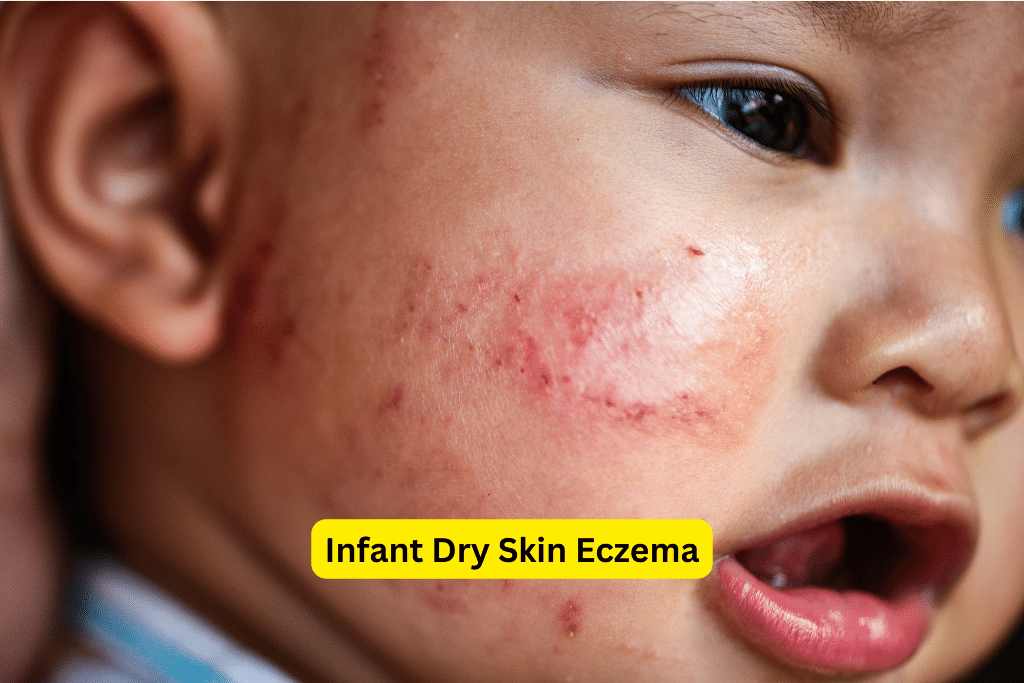Solutions for Baby Eczema and Dry Skin
Infant Dry Skin Eczema
Infant dry skin eczema is a common skin condition that affects many babies. It is characterized by dry, itchy, and irritated skin. In this article, we will explore the causes, symptoms, diagnosis, prevention, and treatment options for infant dry skin eczema. We will also discuss home remedies and strategies for addressing the emotional impact of this condition. Lastly, we will provide guidance on when to consult a pediatrician for severe symptoms or complications.
I. Introduction to Infant Dry Skin Eczema
A. Definition of infant dry skin eczema
Infant dry skin eczema, also known as atopic dermatitis, is a chronic inflammatory skin condition that commonly affects infants. It is characterized by dry, itchy, and inflamed patches of skin.
B. Prevalence of infant dry skin eczema
Infant dry skin eczema is a common condition, with an estimated 10-15% of infants being affected. It usually develops within the first six months of life and can persist into childhood and adulthood.
C. Importance of addressing infant dry skin eczema
Addressing infant dry skin eczema is important to alleviate discomfort, prevent complications, and improve the overall quality of the baby’s life. It can also help in preventing flare-ups and reducing the need for long-term treatment.
II. Causes of Infant Dry Skin Eczema
A. Genetic factors
Genetic factors play a significant role in the development of infant dry skin eczema. It tends to run in families, and babies with a family history of eczema, asthma, or allergies are more prone to developing this condition.
B. Environmental triggers
Various environmental factors can trigger or exacerbate infant dry skin eczema. These may include exposure to irritants such as harsh soaps or detergents, changes in temperature or humidity, and contact with certain fabrics or materials.
C. Irritants and allergens
Irritants and allergens can also contribute to the development of infant dry skin eczema. These can include allergenic foods, pollen, pet dander, mold, and certain chemicals found in household products.
III. Symptoms of Infant Dry Skin Eczema
A. Dry and flaky skin
The most common symptom of infant dry skin eczema is dry, rough, and flaky skin. The affected areas may appear red or grayish in color and may feel rough to the touch.
B. Itching and scratching
Infants with dry skin eczema often experience intense itching, which can lead to constant scratching. This can further irritate the skin, leading to more inflammation and potential infection.
C. Redness and inflammation
The affected areas of skin may become red, swollen, and inflamed. These areas may also feel warm to the touch and may be accompanied by a burning sensation.
D. Rash and blisters
In more severe cases, infants with dry skin eczema may develop a rash or blisters. These can ooze or crust over, causing further discomfort and potential infection.
IV. Diagnosis of Infant Dry Skin Eczema
A. Physical examination
A pediatrician or dermatologist can diagnose infant dry skin eczema by conducting a physical examination of the baby’s skin. They will look for characteristic signs and symptoms, such as dryness, redness, and inflammation.
B. Medical history
The healthcare provider will also take a detailed medical history, including information about family history of eczema or allergies, previous skin conditions, and any potential triggers or irritants that the baby has been exposed to.
C. Allergy testing
In some cases, the healthcare provider may recommend allergy testing to identify any specific allergens that may be triggering or exacerbating the baby’s eczema. This can help in determining appropriate prevention and treatment strategies.
V. Prevention of Infant Dry Skin Eczema
A. Proper skincare routine
A proper skincare routine is essential for preventing and managing infant dry skin eczema. This includes using mild, fragrance-free soaps and cleansers, avoiding excessive bathing, and gently patting the skin dry after bathing.
B. Avoidance of irritants and allergens
Avoiding irritants and allergens is crucial in preventing flare-ups of infant dry skin eczema. This may involve avoiding certain fabrics or materials, reducing exposure to allergenic foods, and using hypoallergenic or fragrance-free products.
C. Moisturizing techniques
Regular moisturizing is key in maintaining the skin’s hydration and preventing dryness. Applying a gentle, fragrance-free moisturizer to the baby’s skin immediately after bathing and throughout the day can help reduce the risk of flare-ups.
VI. Treatment Options for Infant Dry Skin Eczema
A. Topical creams and ointments
Topical creams and ointments are commonly used to treat infant dry skin eczema. These may include corticosteroids to reduce inflammation, moisturizers to hydrate the skin, and barrier creams to protect the skin from irritants.
B. Antihistamines
In some cases, antihistamines may be prescribed to manage the itching and discomfort associated with infant dry skin eczema. These medications can help reduce itching and promote better sleep for the baby.
C. Wet wrap therapy
Wet wrap therapy involves applying a damp layer of clothing or bandages over medicated creams or ointments. This can help enhance the absorption of the medication and provide a soothing effect on the baby’s skin.
D. Phototherapy
In certain cases, phototherapy, also known as light therapy, may be recommended to treat infant dry skin eczema. This involves exposing the baby’s skin to controlled amounts of ultraviolet light, which can help reduce inflammation and improve symptoms.
VII. Home Remedies for Infant Dry Skin Eczema
A. Coconut oil
Applying organic, cold-pressed coconut oil to the affected areas of the baby’s skin can help moisturize and soothe dry skin. However, it is important to consult with a healthcare provider before trying any home remedies.
B. Oatmeal bath
An oatmeal bath can help relieve itching and inflammation associated with infant dry skin eczema. Adding finely ground oatmeal to lukewarm bathwater and letting the baby soak for 10-15 minutes can provide relief.
C. Lukewarm baths
Bathing the baby in lukewarm water instead of hot water can help prevent further drying and irritation of the skin. Avoid using harsh soaps or bubble baths, as these can strip the skin of its natural oils.
D. Humidifiers
Using a humidifier in the baby’s room can help add moisture to the air and prevent the skin from becoming too dry. This can be especially beneficial during the winter months or in areas with low humidity levels.
VIII. Addressing the Emotional Impact of Infant Dry Skin Eczema
A. Support and counseling for parents
Parents of infants with dry skin eczema may experience emotional distress, frustration, and guilt. Seeking support from healthcare professionals, support groups, or therapists can help parents cope with these feelings and find strategies for managing the condition.
B. Coping strategies for infants
Infants with dry skin eczema may experience discomfort, poor sleep, and irritability. Providing a consistent skincare routine, using gentle soothing techniques, and distracting the baby from scratching can help minimize their distress.
IX. When to Consult a Pediatrician
A. Severe symptoms
If the infant’s symptoms are severe, such as extensive rash or blisters, or if there is significant swelling or oozing of the skin, it is important to consult a pediatrician immediately for further evaluation and treatment.
B. Prolonged discomfort
If the baby’s dry skin eczema symptoms persist or worsen despite at-home treatments and prevention strategies, it is advisable to consult a pediatrician. They can reassess the condition, adjust the treatment plan, or explore additional management options.
C. Presence of complications
If the baby develops complications such as skin infections or if their eczema significantly impacts their quality of life, it is important to seek medical attention. A pediatrician can provide appropriate guidance and treatment options.
X. Conclusion
Infant dry skin eczema is a common condition that can cause discomfort and distress for both babies and their parents. It is crucial to identify and address the causes, symptoms, and treatments for this condition to provide relief and improve the baby’s quality of life. By implementing preventive measures, seeking appropriate medical advice, and utilizing home remedies, parents can effectively manage infant dry skin eczema and support their baby’s overall well-being.
"Have You Seen Mike Walden's new holistic acne System yet? It's called "Acne No More" I've read the whole thing (all 223 pages) and there's some great information in there about how to naturally and permanently eliminate your acne without drugs, creams or any kind of gimmicks. I highly recommend it - it's very honest and straightforward without all the hype and b.s. you see all over the net these days. Here's the website where you can get more information:
Click Here -->AcneNoMore









